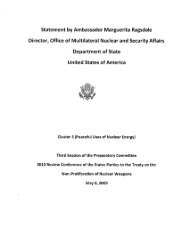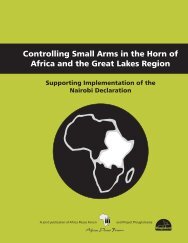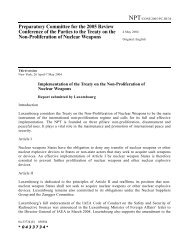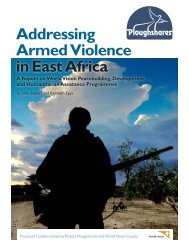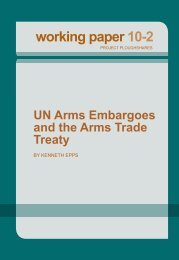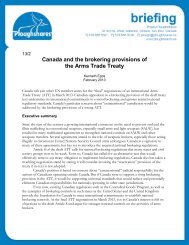Winter 2010 - Project Ploughshares
Winter 2010 - Project Ploughshares
Winter 2010 - Project Ploughshares
You also want an ePaper? Increase the reach of your titles
YUMPU automatically turns print PDFs into web optimized ePapers that Google loves.
Pakistan’s behind-the-scenessupport for the Taliban is believedto be rooted, in large part, in itsconcern that India is attempting toencircle it by gaining influence inAfghanistan. The Taliban is thoughtto offer Pakistan its best chance atneutralizing India’s regional powerexpansion (Pakistan Policy WorkingGroup <strong>2010</strong>). This support has led toincreased instability in Afghanistan,both through heightened terroristactivity and increased opium cultivation(Bajoria 2009). It has also furthercomplicated the international effortsat reconstruction as well as intensifiedthe strain on the already tenuousAfghanistan-Pakistan relationship.As calls for a ‘Grand Bargain’ increasinglyinclude the Taliban, Pakistan’sties with its various strands willbecome all the more relevant.Some commentators have referredto Afghanistan and Pakistan as “conjoinedtwins,” not simply because oftheir complicated history, but alsobecause the ties between the two havebrought about many adverse effects.Consider, for example, the securitythreats linked to the porous borderand the significant costs that Pakistanhas taken on in accommodatingmillions of Afghan refugees.Looking forwardThis past summer saw some encouragingdevelopments. In July, as aresult of high-level talks, HamidKarzai announced that a group ofmilitary officers would travel toPakistan for training. This representsa significant symbolic shift inrelations between the two countries.In that same month Pakistan andAfghanistan finalized a transit tradeagreement, which would allow thetransport of goods along a land routethrough Pakistan to India.While these developments constituteimportant modifications ineach country’s position, they must beviewed in light of longstanding strategicpriorities and fears, especiallythose of Pakistan. If Pakistan stillbelieves that it is facing a perpetuallyhostile regional security environment,enduring peacebuilding strategies arenot likely to emerge.The greatest challenge lies inachieving cooperation between Indiaand Pakistan in Afghanistan. Thiswould require that India and Pakistanovercome longstanding political andpsychological barriers (Maley 2009,p. 90) through direct engagement. Ata minimum, they could discuss howbest to stay out of each other’s wayin Afghanistan. More ambitiously,they could usefully engage in a discussionof the best channels – bilateral,trilateral, or regional – throughwhich to address various governancechallenges. This discussion couldalso identify modest ways in whichIndia and Pakistan might align theirefforts, if not collaborate in achievingcommon goals. The initiation offormal engagement could chart theway to improved and increasinglytransparent relations and ultimately amore stable Afghanistan.Many experts and expert bodieshave pointed out that an opportunityexists to move forward on a richagenda of regional cooperation onmatters, including water management,energy security, and economiccooperation. 1 But the parameters offuture cooperation are being set nowthrough the bilateral maneuveringsof regional players, most importantlyIndia and Pakistan.Note1. See, for example, Maley 2009.ReferencesBajoria, Jayshree. 2009. India-Afghanistanrelations. Council on Foreign RelationsBackgrounder, July 22. http://www.cfr.org/publication/17474/indiaafghanistan_relations.html.Delhi Policy Group. 2009. Afghanistan-India-Pakistan Trialogue: A Report. www.delhipolicygroup.com/pdf/Final%20Book%20-%20Afgh-Ind-Pak.pdf.Gundu, Raja Karthikeya & Teresita Schaffer.2008. India and Pakistan in Afghanistan:Hostile spots. CSIS South Asia Monitor. #117,April 3. http://csis.org/files/media/csis/pubs/sam117.pdf.Hussain, Zahid. <strong>2010</strong>. Kayani spells out termsfor regional stability. Dawn.com, February 2.http://news.dawn.com/wps/wcm/connect/dawn-content-library/dawn/news/pakistan/06-pakistan-does-not-want-to-controlafghanistan-kayani-rs-02.Maley, William. 2009. Afghanistan and itsregion. In The Future of Afghanistan, editedJ. Alexander Thier, USIP: Washington, DC.Pakistan Policy Working Group. 2008. TheNext Chapter: The United States and Pakistan.http://www.brookings.edu/reports/2008/09_pakistan_cohen.aspx.Rubin, Barnett R. & Ahmed Rashid. 2008. Fromgreat game to grand bargain. Foreign Affairs,87:6, pp. 30-44.15Afghan employees from Kandahar City dig a trench to lay piping for the movementof potable water.Credit: Master Corporal Angela Abbey / Canadian Department ofNational Defence.Nicole Waintraubis an intern with<strong>Project</strong> <strong>Ploughshares</strong>.The <strong>Ploughshares</strong> Monitor I <strong>Winter</strong> <strong>2010</strong>



